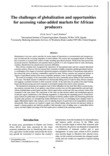The challenges of globalization and opportunities for accessing value-added markets for African producers
JIRCAS international symposium series
| ISSN | 13406108 |
|---|---|
| 書誌レコードID(総合目録DB) | AA1100908X |

本文フルテキスト
intlsymp-11_69-84.pdf810.54 KB
Globalization is the term used to describe the recent impact of innovations in communication and transport systems on trade and the increasing integration of world markets. This process has encouraged nations to liberalize their economies to increase their volume of trade, including agricultural products. Whilst it has been proved that increased economic liberalization and openness leads to growth, it is also recognized that for many developing countries, liberalization has caused serious economic difficulties.
Most African countries have recognized the importance of international trade and have adopted liberalized economic policies. However, this has exposed their economies to highly competitive global agricultural markets. A combination of the impact of structural adjustment programs and partial reform of international trade policies has reduced the prices of primary commodities exported by many African countries and caused an increase in imports of agricultural products from more competitive producers, some of which remain highly subsidized.
The result of oversupply of the commodities markets has led to commodity prices falling to their lowest levels in 40 years. This bleak situation is reflected in the dramatically falling terms of trade for many African countries and suggests a profound downturn in their economic outlook. At the same time, the profits of the major trading houses and the processing and retail companies in developed countries have shown yearly increases.
The international community has recognized some of these difficulties but has made little effort to assist developing countries overcome them. In our opinion, many African countries have not fully appreciated the scale and implications of globalization on their futures and that, without urgent action on their part, they may seriously weaken their economies in the years ahead. The conclusions of this study are that decision-makers and development agencies should give urgent consideration to the following suggestions: (i) improving the negotiating powers of least-developed countries for global trade; (ii) managing the oversupply of primary product exports; (iii) stimulating production of added-value products; (iv) strengthening market information services; (v) developing export strategies based on highly differentiated higher value products; and (vi) reducing imports of goods that can be competitively produced domestically. These measures are required to regain more ethical trading values between rich and poor nations in regard to existing products and wherever possible to find innovative ways of adding value to commodities before export, such that a higher percentage of the final market price is realized in the producing countries.
Most African countries have recognized the importance of international trade and have adopted liberalized economic policies. However, this has exposed their economies to highly competitive global agricultural markets. A combination of the impact of structural adjustment programs and partial reform of international trade policies has reduced the prices of primary commodities exported by many African countries and caused an increase in imports of agricultural products from more competitive producers, some of which remain highly subsidized.
The result of oversupply of the commodities markets has led to commodity prices falling to their lowest levels in 40 years. This bleak situation is reflected in the dramatically falling terms of trade for many African countries and suggests a profound downturn in their economic outlook. At the same time, the profits of the major trading houses and the processing and retail companies in developed countries have shown yearly increases.
The international community has recognized some of these difficulties but has made little effort to assist developing countries overcome them. In our opinion, many African countries have not fully appreciated the scale and implications of globalization on their futures and that, without urgent action on their part, they may seriously weaken their economies in the years ahead. The conclusions of this study are that decision-makers and development agencies should give urgent consideration to the following suggestions: (i) improving the negotiating powers of least-developed countries for global trade; (ii) managing the oversupply of primary product exports; (iii) stimulating production of added-value products; (iv) strengthening market information services; (v) developing export strategies based on highly differentiated higher value products; and (vi) reducing imports of goods that can be competitively produced domestically. These measures are required to regain more ethical trading values between rich and poor nations in regard to existing products and wherever possible to find innovative ways of adding value to commodities before export, such that a higher percentage of the final market price is realized in the producing countries.
| 作成者 | R.S.B. Ferris P. Robbins |
|---|---|
| 公開者 | Japan International Research Center for Agricultural Sciences |
| オンライン掲載日 | |
| 号 | 11 |
| 開始ページ | 69 |
| 終了ページ | 84 |
| 言語 | eng |
